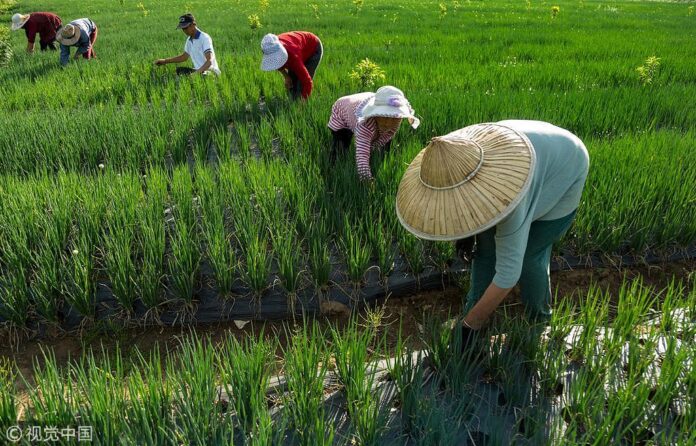The NBS says there is need for a census in the agriculture sector to help policymakers take decisions on boosting output and maximising potential in the agriculture value chain.
Mr Adeyemi Adeniran, the Director, Demography and Household Statistics Department, National Bureau of Statistics (NBS) said this at the Stakeholders Sensitisation Workshop on National Agricultural Sample Census (NASC) for Northern stakeholders in Keffi on Friday.
According to him, the census has become imperartive as the sector is one of the most important sector in Nigeria.
Adeniran said that it represents approximately 24 per cent of the economy and engages well more than 50 per cent of the workforce, both directly and indirectly.
The director said the census was long overdue as the agriculture sector played an important role in the economic and socio-cultural lives of Nigerians.
Adeniran, however, said it had become pertinent that adequate, timely and reliable statistics on the sector were readily available for policy formulation, planning, monitoring and evaluation of progress of programmes and projects.
“As you are all aware, the agricultural sector holds a crucial place in the economic life and socio-cultural lives of Nigerians. Equally important too, is the information emanating from the sector.
“As a nation, it is necessary to know what we produce and how much of it we do, what parts of the country they are produced; the inputs involved in the production.
” The size of manpower employed, the existing challenges in the sector; and the potential within the sector yet to be harnessed. All these information is what the NASC exercise seeks to collect,” he said.
Adeniran said that the NASC was a complete enumeration of all agricultural activities within the country, which include both small holder farmers and large corporate farms.
He said that the exercise would be executed in two phases, the first being the Listing Phase, and the second being the Sample Survey Phase.
Adeniran explained that for the first phase, enumerators would visit selected farms and farming households to collect information.
“The scope of information to be collected in this phase include demographic details of the holders, and type of agricultural activity (crop production, fishery, poultry, or livestock).
“The type of produce or product for example, rice, maize, sorghum, chicken, or cow, and the details of the contact persons,” he said.
He said further that in the second phase, a sample of the farms listed under the first phase would be taken and more detailed information collected.
He added that the data such as size of the holding, area cultivated, total yield, type of farming practices, inputs, and challenges, among others would be gathered.
Adeniran said that the entire process for the exercise would be carried out digitally for the first time in Nigeria.
He said that NBS had plans with the National Population Commission to secure newly demarcated digital enumeration maps of the entire country.
According to him, these newly carved out maps will serve as a basis for the segmentation of the areas we intend to visit for this assignment.
He said that training would be conducted in Abuja for the trainers and at the state level for the enumerators.
To safeguard and ensure the integrity of the exercise, Adeniran said adequate physical monitoring and spot-checks would be conducted by senior level officers of the bureau.
Adeniran said this was to ensure enumerators followed the laid down protocols for data collection and also intent on assisting the field personnel in resolving any logistical or operational issues.
He called for the cooperation of agricultural households, establishments, and communities across the country toward the exercise was successful.
“The information you supply under this exercise is vital and will be extremely useful in assisting government gain a better understanding of the structure and composition of your sector.
” It will also provide a more detailed and precise picture of your needs, and the challenges you face, so that appropriate and targeted interventions can be made.
According to him, the success of this census rests on all our shoulders and we cannot shy away or abdicate this responsibility,.
“We must be alive to it and work hard to ensure we achieve a successful outcome. In the end, our dear country will be the better for it.
In her goodwill remarks, Prof. Sarah Anyanwu, former President, Economic Society of Nigeria, said that the role agriculture played in the economy, could not be overemphasised because it helped to eliminate poverty, and hunger and achieve the SDGs.
“Agriculture brings foreign exchange and encourages rural farmers and provides income and welfare for those in the rural areas.
” It is important to see we have an agriculture policy in the country which would help the teaming unemployed youths to engage in farming which will be of good service to them if made viable and attractive, “she said.
Dr Kabiru Nakaura, the Chairman, Governing Board, NBS, said that for the agriculture sector to thrive, information must be made available to the government to enable the planning and formulation of adequate policies.
“Without correct information, you cannot get a correct policy and without the correct policy you cannot get a correct execution and without a correct execution, you cannot get a correct implementation or dividends of democracy.
” Without data, you cannot get information, without information you cannot plan, without planning you cannot execute.”
The Governor of Nasarawa State, Adullahi Sule, represented by Mr Emmanuel Alidzi, the Permanent Secretary, Ministry of Finance, Budget and Planning, said that plans were ongoing to establish the Nasarawa State Bureau of Statistics.




